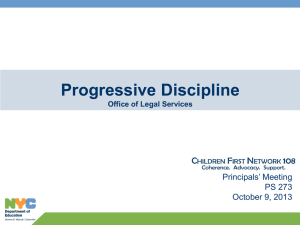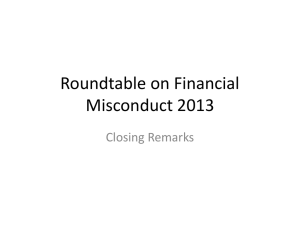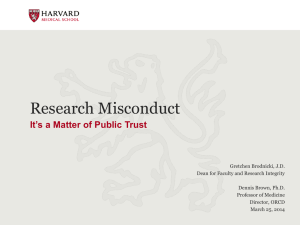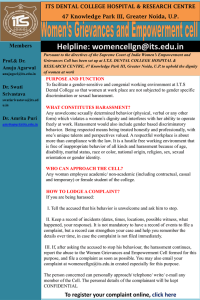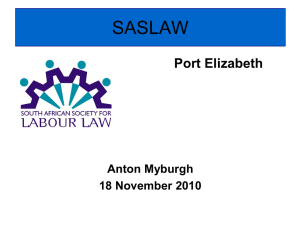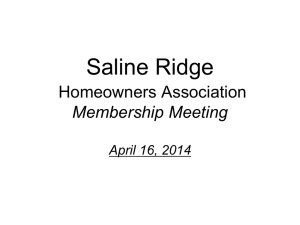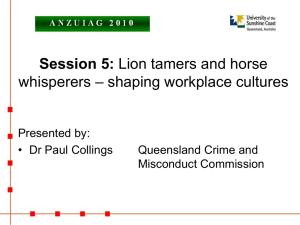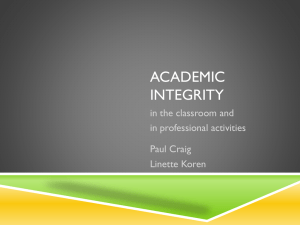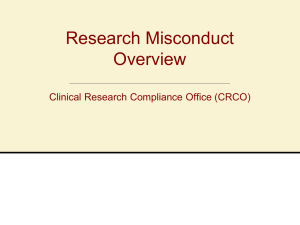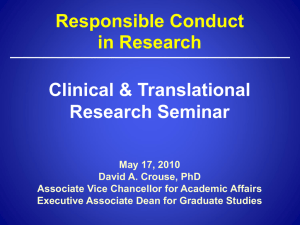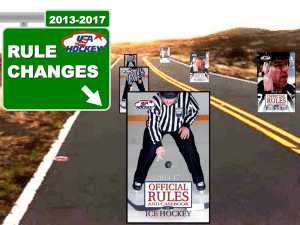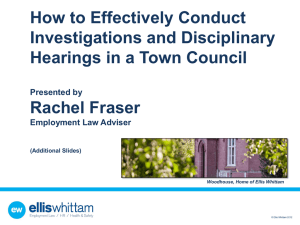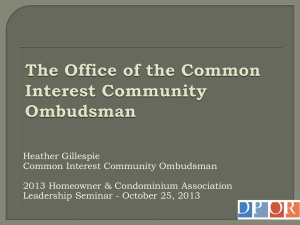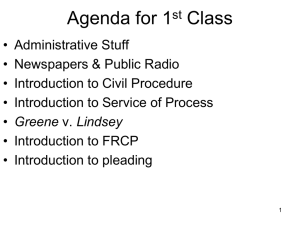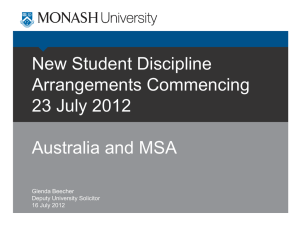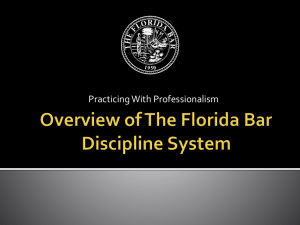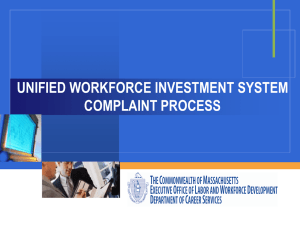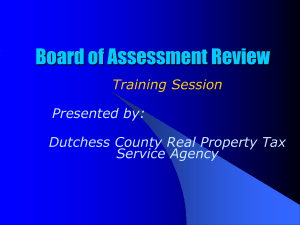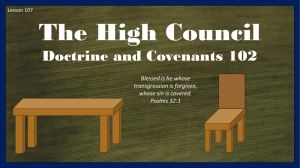Code of Conduct by S.Kumar
advertisement
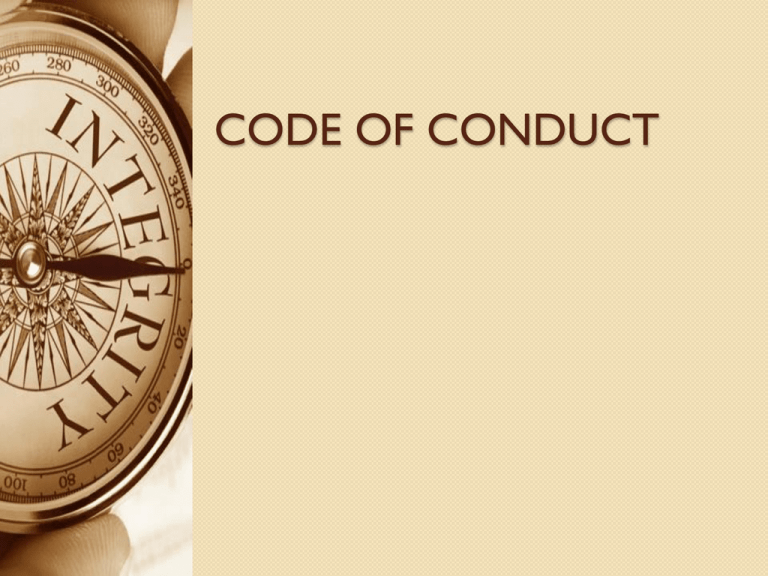
CODE OF CONDUCT OVERVIEW The Company Secretaries Act, 1980: Chapter V – Section 21 to 22E First Schedule Second Schedule The Company Secretaries (Procedure of Investigations of Professional and Other Misconduct and Conduct of Cases) Rules, 2007 MISCONDUCT Definition of Misconduct Section 22 of the Company Secretaries Act read with Schedule I and II AUTHORITIES DISCIPLINARY DIRECTORATE BOARD OF DISCIPLINE DISCIPLINARY COMMITTEE Appellate Authority Also discuss what is the course available after Appellate Authority Also the complainant cannot file appeal before the Appellate Authority DISCIPLINARY DIRECTORATE Council has constituted Disciplinary Directorate (DD). Complaint would be first received by DD then he will form a prima facie opinion. Depending on the Schedule which covers the Misconduct, DD further places the matter before Board of Discipline or Disciplinary Committee. Misconduct Schedule I Schedule II Board of Discipline Disciplinary Committee WITHDRAWAL The Complaint can be withdrawn at any time subject to the permission of BOD or DC 21A. BOARD OF DISCIPLINE CONSTITUTION Council of ICSI constitutes BOD: Presiding Officer : Person with experience in Law and having knowledge of Disciplinary matters and profession 2 Members : 1 Elected Council member Chief Executive of the Institute appointed under section 16(1)(c) of the Act DD functions as Secretary to the BOD Summary procedure adopted by BOD for disposal of complaints If found guilty, an Opportunity of being heard given to the member before making any order. PUNISHMENT Reprimand Removal of the name from the Register of members upto 3 months Fine upto Rs. 1 Lakh If DD is of the view that there is no prima facie case in the complaint, he will inform accordingly to the board. If Board Agrees - File closed Disagrees - DD shall further investigate 21B. DISCIPLINARY COMMITTEE CONSTITUTION Council constitutes DC consisting of: President or VP of Council as Presiding Officer 2 Council members 2 Eminent persons nominated by Central Government Present Disciplinary Committee Presiding officer- Mr. R. Sridharan Members- Mr. Sanjay Grover Mr. Sudhir Babu C Mr. S. Balasubramaniam Mr. S. K. Tuteja Council may constitute more Disciplinary Committees DC free to prescribe own procedure Before making any order, awarding punishment - Opportunity of being heard given to the Member. PUNISHMENT Reprimand Removal of name from the Register of Members (Even Permanently) Fine upto Rs. 5 Lakhs POWERS OF CIVIL COURT The Authority, Disciplinary Committee, Board of Discipline and Director Discipline are vested with the powers of civil court under the Code of Civil Procedure, 1908 in respect of the following matters, namely: Summoning & Enforcing attendance Examining on oath Discovery & Production of Documents Receiving evidence on Affidavit Person ceasing to be a member of ICSI is subject to code of conduct if alleged misconduct was conducted during the period of his membership. Misconduct could be professional as well as other misconduct, the other misconduct has been included in Part – IV of First Schedule and Part-III of Second Schedule APPELLATE AUTHORITY Appellate Authority for CA, CS and ICWA is same except that the two members will be nominated by the respective Institute. Three members including the Chairman will be common. The Authority shall function in accordance with Section 22A – 22E of the CS Act. Section 22E provides for appeal to authority: Any member aggrieved by order of BOD/DC may within 90 days from communication of order to him, prefer an appeal DD (subject to authority from the Council) may also file an appeal against decision of BOD/ DC Delay beyond 90 days can be condoned by Appellate Authority Appellate Authority may Confirm Modify Set Aside Order/ Penalty OR Remit the case back to BOD/ DC Opportunity of being heard given to the concerned parties There is no provision for filing appeal by the complainant. In such a scenario writ is the only option FIRST SCHEDULE PART I- Misconduct in relation to PCS Allowing a non-member to practice in one’s name Sharing fees with a non member Accepting profits of a Professional work of a person, who is a non-member Entering into Partnership with a nonmember Securing Professional assignment through a person unless he is an employee or a partner Soliciting clients or professional work directly or indirectly. ---Applying/ Requesting/ Inviting/ Securing work from other PCS permitted ---Replying to tenders or enquiries permitted. Advertising his attainment or services or using designation other than CS ---Displaying degree of University or membership of other professional bodies, if approved by Council, is permitted. ---Limited advertisement subject guidelines issue by Council permitted to Accepting position of PCS without communicating with earlier incumbent in writing. Charging fees as a percentage of profit or contingent on finding of result of the assignment. Engaging in any business/ occupation other than profession of PCS ---Directorship in other companies is permitted Allowing a non partner to sign on one’s behalf any certificate to be given as PCS. PART II- Misconduct in relation to members in service Sharing of Emoluments with any other person Accepting fees or profits from lawyers, CS, brokers, agents or customers by way of Commission or Gratification PART III- Misconduct in respect of all Members Describing oneself as fellow without being FCS. Not supplying information called by Council/ Committee of the Council/ DD/ BOD/ DC/ QRB or Appellate Authority Giving false information for procuring assignment. Carry-on practice as a Company Secretary without proper Certificate of Practice. PART IV- Other Misconduct If held guilty by any court for an offence punishable with imprisonment for a term upto 6 months Bringing disrepute to the profession or the institute due to his action whether related to Professional work or otherwise. SECOND SCHEDULE PART I- Misconduct in relation to PCS Disclosing confidential information of client to others Issuing certificate or report without examining the facts by himself or by his partner or employee or other PCS Vouching accuracy of forecast or future transaction Expressing opinion in respect of an enterprise in which he/ his partner has substantial interest Suppressing material fact in report or certificate Failing to report material misstatement Not exercising due diligence or being negligent in Professional duties Failing to obtain sufficient information before reporting or certifying. Failing to bring out material departure from acceptable procedure relating to Secretarial practice. Not keeping advances received from client for expenses in separate bank account. PART II- General Misconduct Contravening provisions of CS Act, 1980 or regulations or guidelines issued by the Council. Disclosing confidential information of a employee to others Including false information to Institute, Council, Committee of Council, DD, BOD, DC, QRB or Appellate authority. Embezzling money received in Professional capacity PART III- Others If held guilty by the court for an offence punishable with an imprisonment for a term exceeding six months. The Company Secretaries (Procedure of Investigations of Professional and Other Misconduct and Conduct of Cases) Rules, 2007 SUMMARY OF RULES Complaint is to filed in Form I in triplicate before DD If complainant is a company, Board Resolution is necessary Prescribed fee (non-refundable) of Rs. 2500/- to be paid Fee to be paid by Demand Draft in favour of ICSI Unique reference number given by DD if complaint found to be in order A fresh complaint may be clubbed with the previous complaint on the same matter against the same member Complainant has right to rectify the defects in complaint & resubmit the same. Such rectification to be done within given time Action can be taken suo -moto on receipt of any information about misconduct or on a complaint. Any anonymous information received by DD is not to be entertained. Within 60 days of receipt of complaint a copy of complaint has to be forwarded to PCS or Member Written statement to be filed within 21 days by the defendant Rejoinder to be filed within 21 days by the Complainant. Every communication from BOD/DC has to be done by RPAD DD/ In case addressee refuses to receive it is deemed to have been served on addressee Under rule 12 DD may refuse to entertain the complaint/information if filed/received after seven years of commission of the alleged misconduct. Principle of natural justice required to be followed DHANYAWAAD
